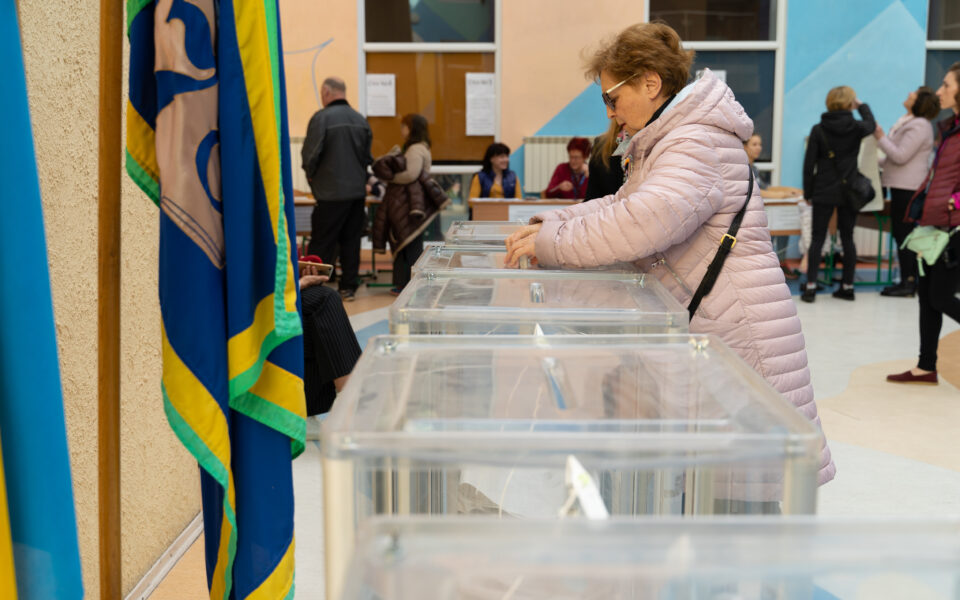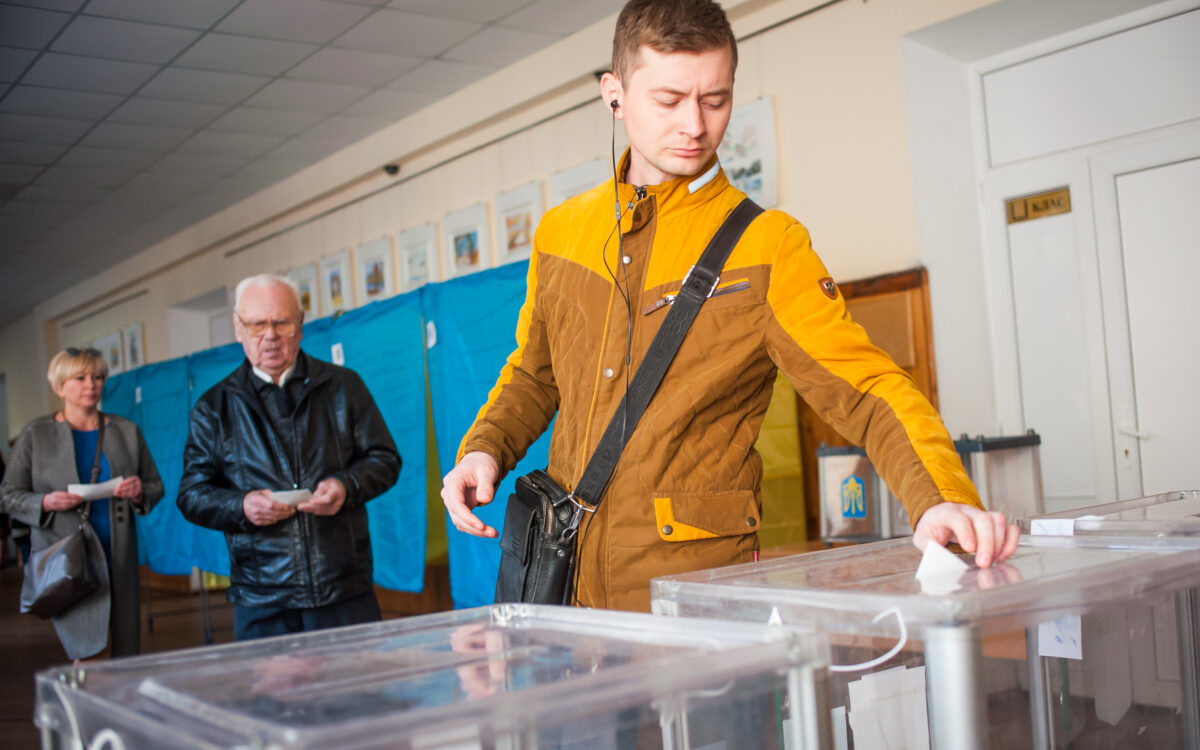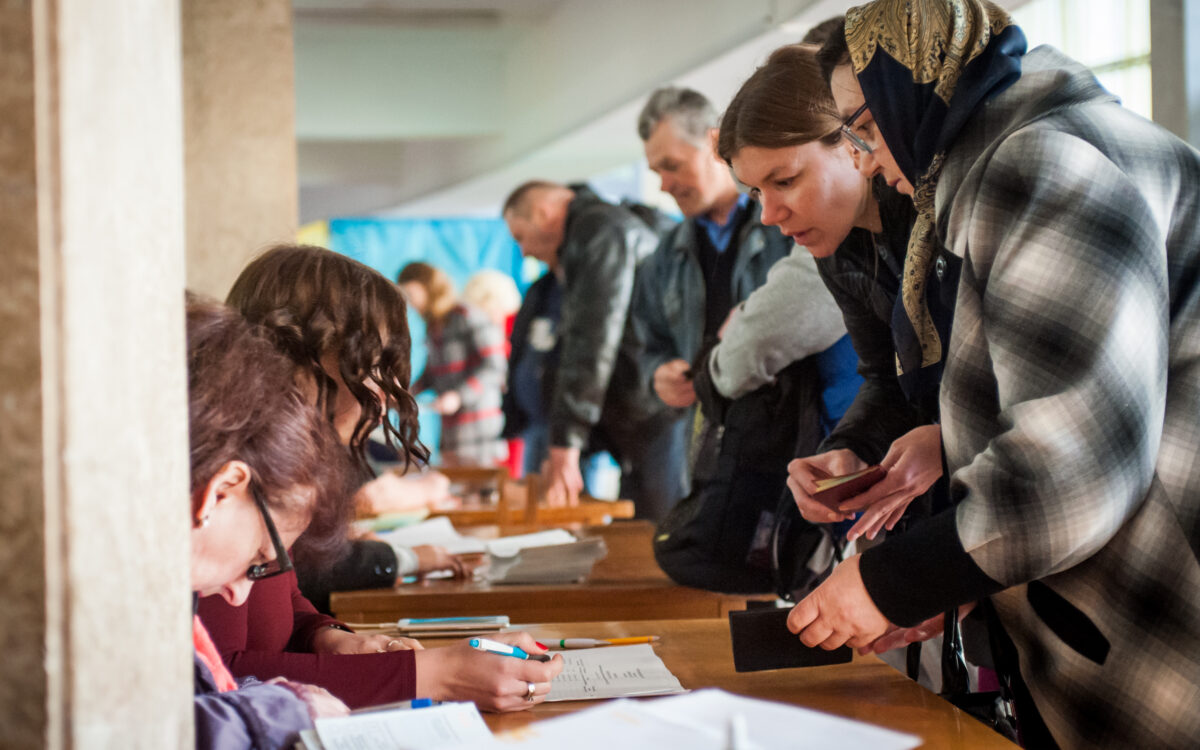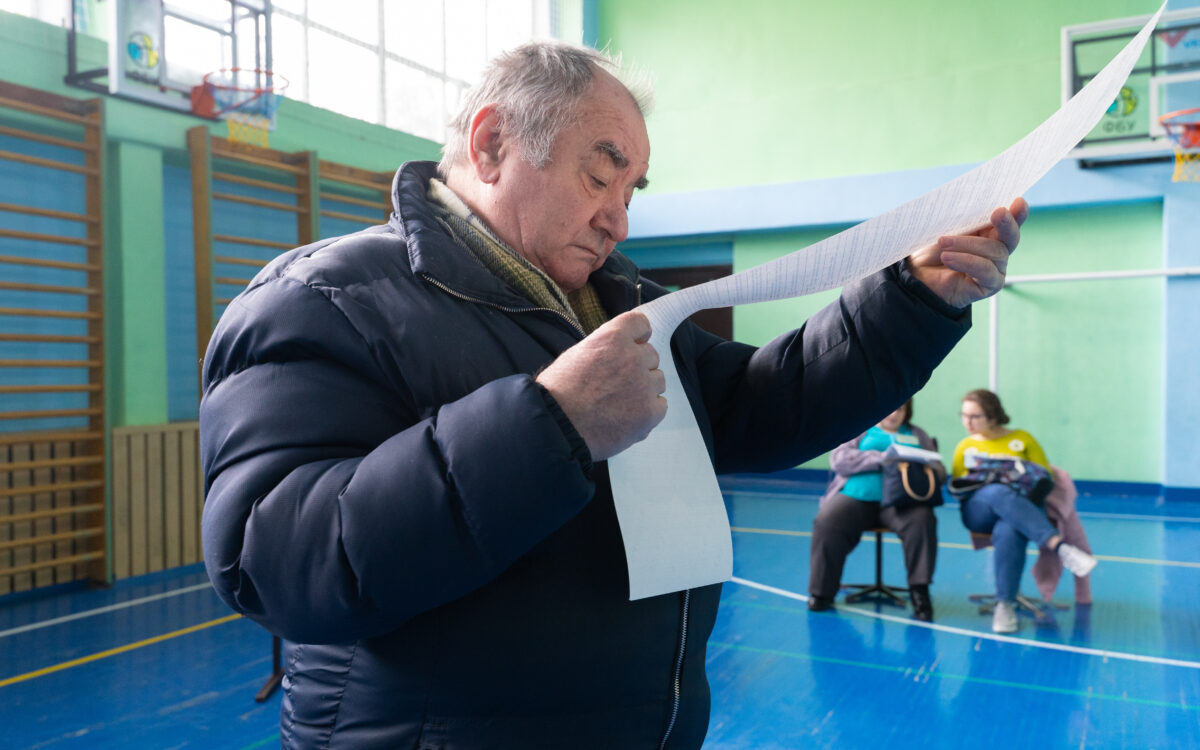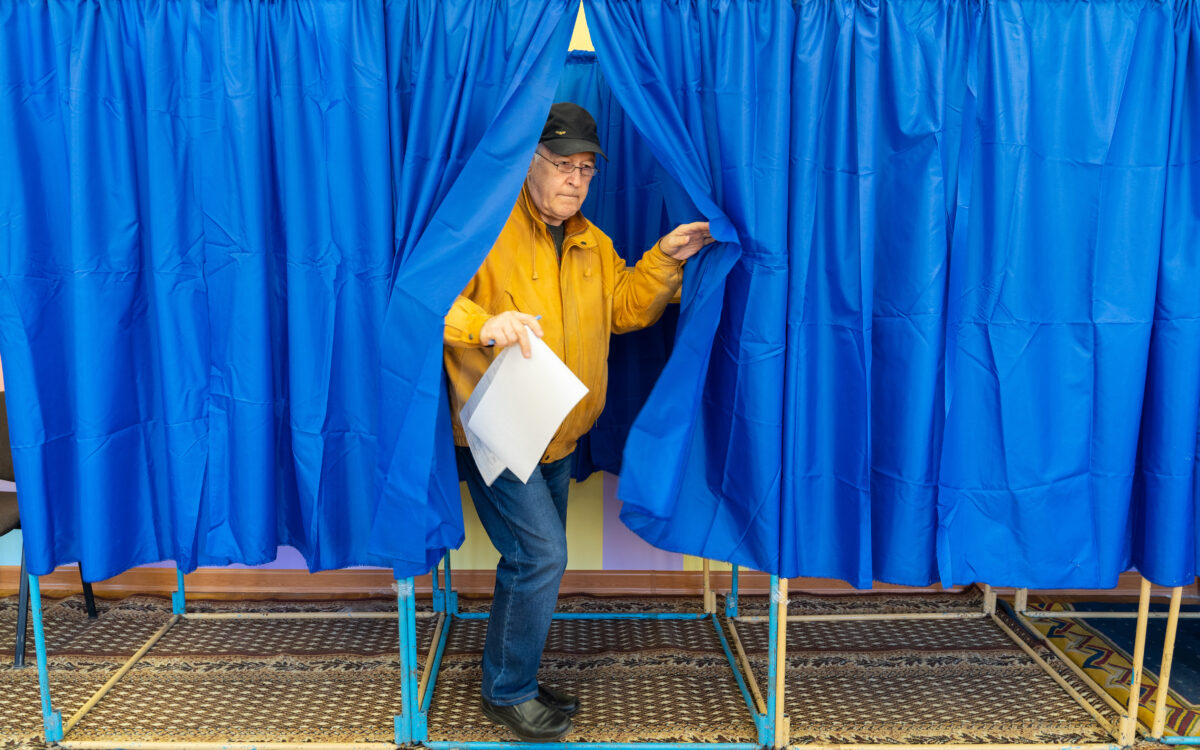
IFES Election Bulletin #195 (December 2 – 15, 2023)
18.12.2023
Verkhovna Rada of Ukraine Resumes Political Party Reporting After More than a Three-Year Pause
19.01.2024IFES-CEC Training Center Presents New Research on EMB Training and Capacity Building. On December 7, the IFES-Central Election Commission Training Center presented a study titled, “Electoral Management Bodies Training and Capacity Building: Best Practices, Challenges and Approaches” for members of the CEC and their secretariat.
Researchers introduced effective approaches to professional development and training of election administrators based on comparative analysis of different practices and solutions adopted by selected electoral management bodies, or EMBs.
The study addressed electoral training practices in more than 30 independent election commissions around the world. The survey was conducted at the request of the CEC as part of IFES’ assistance in administering electoral processes through training election commissioners.
Presentation of the paper was made by Rushdi Nackerdien, IFES Senior Global Advisor for training and capacity building; and, Pavel Cabacenco, IFES Election Management Program Advisor. The presentation event was moderated by a co-author of the study, Evgeniy Krikopolo, Deputy Director of the IFES-CEC Training Center.
Access the full text of the research is here.
IFES Ukraine Holds Gender Equality Electoral Process Seminar. IFES Ukraine and the CEC organized an interactive online seminar titled, “Gender Equality in Electoral Processes in Ukraine,” to develop a strategic vision for CEC to work with civil society.
CEC member Viktoriia Hlushchenko delivered a welcoming speech and reminded the audience the CEC joined the Women in Electoral Management-International which is the only specialized international association dedicated to gender equality at all levels of election administration.
“I would like to emphasize that the CEC has introduced the practice of consulting with civil society,” said Mrs. Hlushchenko. “Unfortunately, the war has made adjustments to the work of the Commission. But, now I hope we will resume this good practice of communication. Because the protection of women’s rights and their support is an extremely important goal set out in the CEC’s strategic plan.”
Seminar discussions led to suggestions on ensuring equal participation of men and women in the first elections upon the end of Russia’s war in Ukraine with involvement of the CEC and Ukrainian civil society.
Read more via this link.
Ukrainians divided over what should happen to politicians from now banned parties. A nationwide opinion poll conducted by Ilko Kucheriv’s Democratic Initiatives Fund in cooperation with the Sociological Service of the Razumkov Center at the request of the CHESNO movement indicates that Ukrainians remain divided over what should happen with politicians elected on the lists of the suspended so-called pro-Russian parties.
Some 7.5 percent responded that the mandate of current members of Parliament from these parties should have their mandate terminated early (with 10.5 percent additionally wanting to barring them from running for elected office in the future) – 14.1 percent wanted to subject them to lustration and bar them from holding certain state positions, while further 22.6 percent favor handing them over to the prosecution for possible state treason. Most respondents – 38.4 percent – favored either of the above-listed measures. Only one percent responded in favor of not touching these politicians.
Several of the listed options above are not possible under Ukrainian law and Constitution or suggest introducing questionable principles into the Ukrainian legal system such as ‘collective guilt’ which run contrary to Ukraine’s international obligations.
The opinion poll was conducted in Mid-December 2023 with 2019 respondents from across Ukraine and with a 2,3 percent margin of error. Compared to a similar poll conducted a year ago, more Ukrainians now favor to prosecute politicians individually for possible facts of state treason.
The opinion survey results, in which the overwhelming number of Ukrainians express opposition to pro-Russian politicians, is at this link.
IFES Ukraine Conducts Two-Day Training for National School of Judges. On December 18-19, IFES Ukraine administered electoral training for judges titled, “Preparation and Facilitation of Training in the National School of Judges.”
The event’s purpose was to equip a team of judges with skills and experience necessary to prepare, conduct and facilitate training events using state-of-the-art teaching methods. The event addressed the skill of being a trainer and facilitator, trust in the trainer and facilitator and his or her authority and specific adult learning elements.
Participants made presentations to their colleagues in groups and, in the teamwork training, they received recommendations on improving their training techniques and ability to work with an audience.
The training was conducted by IFES Ukraine facilitators Yevheniia Pavlovska, Aliona Sheshenia, Diana Ashurova and Oleksiy Lyubchenko.
Read more about the training here.
State Register of Voters’ Database Will be Updated Regularly by the CEC. The Central Election Commission administers systematic work to restore functioning of the State Voter Register, the SVR, in the context of current security challenges. On December 22, the Commission approved renewal of periodic updating of the SVR database using the automated information and communication system, “State Register of Voters.”
The work will go forward without participation of the Register’s maintenance bodies which are not functioning due to temporary occupation by Russia.
“It should be emphasized that the adopted resolution is only aimed at updating the database of the State Register of Voters and restoring its periodic updating,” said CEC Deputy Chair Serhii Dubovyk. “Today’s decision of the Commission does not provide for the restoration of the Registry’s services related to Internet access. At the same time, the state authorities will be able to take measures envisaged by the current legislation to ensure the constitutional rights of citizens in the context of armed aggression against our country.”
The CEC appealed to the Administration of the State Service of Special Communications and Information Protection, the National Police and the Security Service to take measures ensuring cyber security and minimize threats to the reliable and secure functioning of the SVR and its regional affiliates.
Read more here.
Training With CEC Delegation in Stockholm, Sweden. Stockholm-based International Institute for Democracy and Electoral Assistance, or IDEA, organized training for the CEC titled, “Building Capacity for Election Risk Management: Technical Training and Consultations with the Central Election Commission on an Election Risk Management Tool.”
International IDEA is collaborating with Ukrainian election management to develop a strategy for the first post-war elections.
In 2022, the CEC invited International IDEA to Ukraine to develop institutional competence and capacity in identifying, documenting and managing risks and on September 13 of that year, International IDEA presented the ERMTool to the Commission. ERMTool is short for the Electoral Risk Management Tool and, “is designed to empower people to ensure peaceful and credible elections. Intended users are electoral management bodies, security sector agencies, civil society and other state and non-state actors. The ERMTool aims to build the user’s capacity to understand, analyze, and mitigate electoral risks.”
In October 2023, IDEA agreed to conduct technical training for the CEC.
The primary training goal is building technical capacity of CEC members and its secretariat to work with the ERMTool throughout the election cycle.
After completing the training, participants gained the ability to enter and analyze data, generate situational analysis and risk alerts and generate a register of risks and measures.
In addition to the training, the CEC delegation met with Swedish Election Authority colleagues, learned about their experience in electoral risk management and strengthened overall cooperation between the CEC and Swedish Election Authority.
Read more here.
Global Media Outlets Highlight 2024 As An Election Year. The Associated Press, Bloomberg, Economist, Forbes, Guardian, Vox and the Wall Street Journal all published articles in late 2023 about elections around the world in 2024.
Ukraine was scheduled to hold presidential elections this year; but now should prepare for the first post-war elections because they will be the most difficult, given the challenges caused by Russia’s war.
Time magazine listed countries where elections will be held with information on where, when and type of election systems. The number of voters in the country and the country’s assessment of freedom and justice are also covered by Time. The NDI website offers a Global Election Calendar to track election dates and locations.
The first notable election in 2024 is Taiwan’s presidential election on January 13.
2024 – Biggest Election Year In History. More than 60 countries, representing half of the world’s population – approximately four billion people – will hold regional, legislative and presidential elections with the potential to shake up political institutions as well as increase geopolitical tensions.
As the United States enters its presidential race, other countries are also preparing to possibly oust incumbent officeholders amid civil protests that could destabilize some regions.
Europe is likely to see an increase in the number of right-wing extremists in the European Parliament who may try to undermine European institutions. In Asia, the aforementioned elections in Taiwan could escalate tensions in the Indo-Pacific; and, in Africa, elections in Senegal, South Africa, Mali and Chad could determine the role and trajectory of multilateral institutions across the continent.
Mexico is holding a vote that could affect cooperation on critical trade and border security issues with the U.S.
IFES President Anthony Banbury said while “authoritarians are deploying a sophisticated playbook to gain and hold on to power,” he sees that “democratic forces are fighting back.”
Read an article about the challenges of conducting elections worldwide this year.
NACP Reports First Results of Political Party Financial Reporting. At the conclusion of December, political parties were once again required to report their finances and the National Agency for the Prevention of Corruption (NAPC) began to verify them.
The NACP found that:
- The Narod party’s report for the fourth quarter of 2020 does not include information on financial liabilities of nearly UAH 30,000 (equivalent of USD 790), which is considered an administrative offense.
- The report of the Patriotic Party of Ukraine for the 4th quarter of 2021 does not contain information on property, income, expenses and financial liabilities for 14 local party organizations, which is an administrative offence.
- The Servant of the People party returned UAH 48.967 million (USD 1.29 million) of unused funds to the state budget.
- State funding for Holos was resumed by NACP after addressing reasons for its suspension. The NACP concluded on December 21, 2020 that Holos’ 2020 second quarter report contained inaccurate information regarding expenses totalling UAH 1,328,280 (USD 34,860).
- In 2024, the state budget allocated less money for financing political parties with representation in the Verkhovna Rada than the amount stipulated by law, as reported by CHESNO. This year, parliamentary parties’ statutory activities will be financed with UAH 840.5 million (USD 22.06 million). According to a formula established by law, this amount should have been UAH 988.9 million (USD 25.05 million).
Parliament Approves Draft Law on Lobbying on First Reading. On January 10, the Verkhovna Rada passed on first reading legislation on fair lobbying (Draft Law Number 10337) which was submitted by the Cabinet of Ministers on December 13.
According to parliamentary rules of procedure, it is up to the Rada’s Legal Policy Committee to advise the Rada plenary session on the specific lobbying draft law for consideration as well as the draft laws that should be discarded. The Legal Policy Committee recommended the Rada adopt Draft Law Number 10337 and reject two alternative draft laws submitted by individual MPs.
On January 8, IFES Ukraine and other civil society representatives were involved in the Committee’s discussion of Draft Law Number 10337. In its current form, the Draft Law requires improvements to regulating lobbying and can be strengthened with additional amendments in the context of clarifying key definitions while excluding civil society organizations from the scope of the law and refinements to other elements of the legislation.
Enacting a law covering lobbying is a crucial step towards Ukraine’s membership in the European Union which became closer to reality in December when the European Council voted to initiate accession negotiations with Ukraine.
Access the text of Draft Law Number 10337on the Verkhovna Rada website here.


